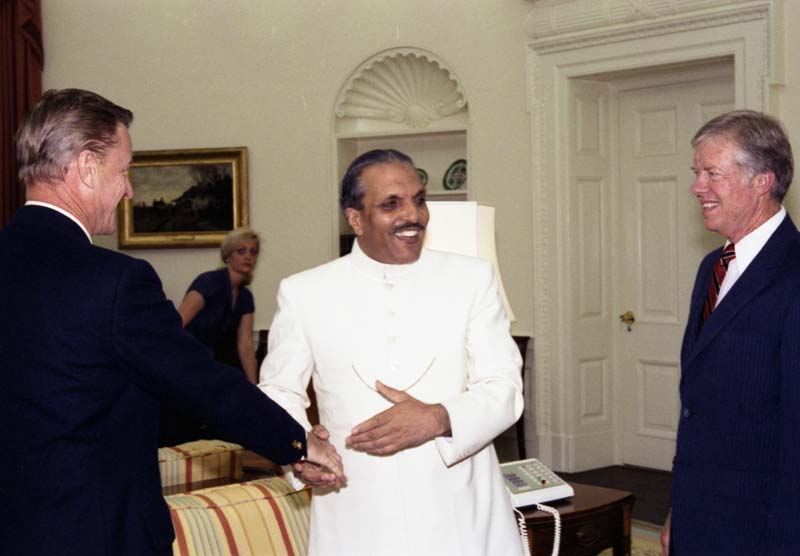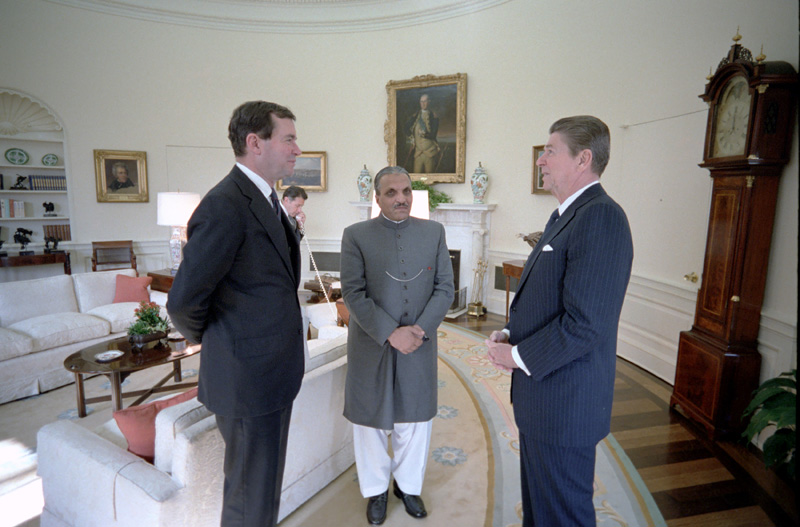By Khalid Khan
The 46-year history of Jihadism that is still killing innocent Pakistanis started in October 1979; before the Soviet Union formally invaded Afghanistan, when JUI chief Mufti Mahmood issued a fatwa declaring Jihad against the communist revolution in Kabul. The Afghan communist regime, led by the People’s Democratic Party of Afghanistan (PDPA), had launched sweeping socialist reforms, including land redistribution and women’s rights initiatives. These changes threatened the traditional power of clerics and religious factions, who responded not with dialogue but with armed resistance.

Mufti Mahmood, due to illness, sent his son, Maulana Fazlur Rehman, to a gathering of religious scholars in South Waziristan. There, the so-called religious justification for Jihad and migration to Afghanistan was formally endorsed. This marked the beginning of a war that had nothing to do with defending Islam and everything to do with clerical opposition to modernization. The religious leadership’s reckless call to arms destabilized Afghanistan, making Soviet intervention inevitable in December 1979.
The so-called Mujahideen, were responsible for the deaths of three million Afghans
Jamaat-e-Islami (JI) and other religious parties swiftly aligned with Afghan Islamist factions, framing the conflict as a sacred duty. Pakistani Pashtuns, particularly from the tribal regions, were brainwashed into believing they were fighting for Islam. Religious seminaries became recruitment hubs, where young men were prepared to sacrifice their lives for a war that had no real religious legitimacy. The clerics, uninterested in the long-term consequences, glorified jihad and turned their followers into cannon fodder for an ideological battle against communism.

Religious leaders presented this war as a battle between good and evil, deliberately ignoring the socio-political realities of Afghanistan. The PDPA’s policies, though authoritarian in implementation, sought to modernize Afghanistan. However, clerics portrayed these changes as an attack on Islam. The truth was that these so-called religious warriors were defending their privileges rather than Islam itself.
Extremism, terrorism, and sectarian violence have become a permanent feature of Pakistani society since Afghan Jihad
This clerical manipulation led to the mobilization of over 35,000 foreign fighters from across the Muslim world, alongside tens of thousands of Pakistanis. The long-term consequences for Pakistan were catastrophic. Over four decades later, the country is still suffering. Extremism, terrorism, and sectarian violence have become a permanent feature of Pakistani society since Afghan Jihad. The jihad factories that once produced so-called holy warriors for Afghanistan have now turned against Pakistan itself.
The so-called Mujahideen, once hailed as heroes, evolved into warlords and terrorists. Reports suggest that during and after the Soviet withdrawal, these fighters were responsible for the deaths of three million Afghans. In Pakistan, the seeds of this so-called jihad grew into the modern-day militant groups that have ravaged the country. The Tehreek-e-Taliban Pakistan, Lashkar-e-Jhangvi, and countless other extremist factions are the byproducts of the very ideology promoted by these clerics. The same madrassas that recruited young men for Afghanistan in the 1980s are now breeding grounds for terrorists who target Pakistan’s citizens, military, and security forces.
The war also transformed Pakistan’s tribal belt into a breeding ground for extremism. Before the Afghan jihad, these regions were deeply conservative but largely peaceful. However, decades of militant activity turned them into safe havens for international terrorist organizations. The arms and drug trade flourished as warlords amassed wealth, further entrenching violence in the region.
Since the early 2000s, Pakistan has lost over 82,000 lives to terrorism. The economy has suffered losses exceeding $150 billion due to the persistent wave of extremist violence. Yet, the mullahs who started this fire refuse to take responsibility. Instead, they continue to spread their venomous rhetoric, fueling hate and division. They manipulate religious sentiments to maintain their grip on power, ensuring that the flames of jihad never fully die out.
Anti-Soviet elements were trained mostly in Pakistan to ensure they could effectively utilize advanced weaponry. The training was provided directly by Western intelligence agencies or through third-party countries
The recently declassified CIA documents now expose the full extent of this deception. In 2023, the U.S. National Security Archive released confidential records confirming that the Afghan jihad was engineered by Washington. According to these documents, President Jimmy Carter initiated U.S. involvement in the Jihad through Gen Ziaul Haq in Pakistan, with financial backing from the CIA. The U.S. contributed $2.1 billion to the effort, while a Middle Eastern country provided $2 billion. These funds were funneled through Pakistan, where intelligence agencies and religious groups worked together to recruit, train, and arm fighters.
The documents detail how anti-Soviet elements were trained mostly in Pakistan to ensure they could effectively utilize advanced weaponry. The training was provided directly by Western intelligence agencies or through third-party countries. The war had nothing to do with Islam or the protection of Muslims. It was part of a calculated U.S. strategy to weaken the Soviet Union and establish American global supremacy.
Jimmy Carter, whose administration laid the groundwork for this war, passed away in late 2024 at the age of 100. His role in weaponizing religious sentiment left an irreversible impact on the Muslim world. However, the true enablers of this destruction were the clerics and Islamist leaders who sold this war as a religious obligation. They turned their followers into expendable tools for foreign interests, leading millions to their deaths.
Today, Pakistan remains trapped in a cycle of extremism. Suicide bombings, targeted killings, and sectarian violence continue to plague the country. Each time the state attempts to take action against militants, religious parties mobilize to protect them, using street protests and political pressure. The same clerics who once encouraged young men to fight in Afghanistan now stand in the way of efforts to rid Pakistan of terrorism.
Pakistan’s internal security challenges are a direct consequence of the clerics’ manipulations. The narrative of religious warfare has been so deeply ingrained in society that even today, many Pakistanis fail to see how they were deceived. Extremist ideologies have permeated educational institutions, mainstream politics, and even sections of the military. The religious right uses emotional appeals to suppress dissent, ensuring that critical thinking remains absent from the national discourse.
Related Story: “From Operation Cyclone to Operation Enduring Freedom”: A Told Story
Pakistan’s foreign policy has also suffered due to this history. The country’s reputation as a haven for terrorists continues to impact its global standing. Countries that once funded Pakistan’s jihad now view it with suspicion. Even China, Pakistan’s closest ally, has expressed concerns over extremism spilling into its Xinjiang region.
Meanwhile, Afghanistan, the battleground where this jihad was fought, remains in turmoil. The rise of the Taliban in 1996, their eventual overthrow in 2001, and their return to power in 2021 all stem from the same clerical ideology that Pakistan exported decades ago. The cycle of violence remains unbroken, and millions of Afghans continue to suffer under the rule of militant groups that were once glorified by religious leaders.
The war was not a jihad. It was a betrayal, one orchestrated by Western powers but made possible by religious leaders who hijacked faith for political gain. The Afghan jihad was never about Islam. It was about power, manipulation, and the blind obedience of those who failed to question the real motives behind the war. The price of this deception is still being paid today, as Pakistan bleeds from the wounds inflicted by the very ideology these clerics continue to preach.
Disclaimer:
The views and opinions expressed in this article/Opinion/Comment are those of the author and do not necessarily reflect the official policy or position of the DND Thought Center and Dispatch News Desk (DND). Assumptions made within the analysis are not reflective of the position of the DND Thought Center and Dispatch News Desk News.
